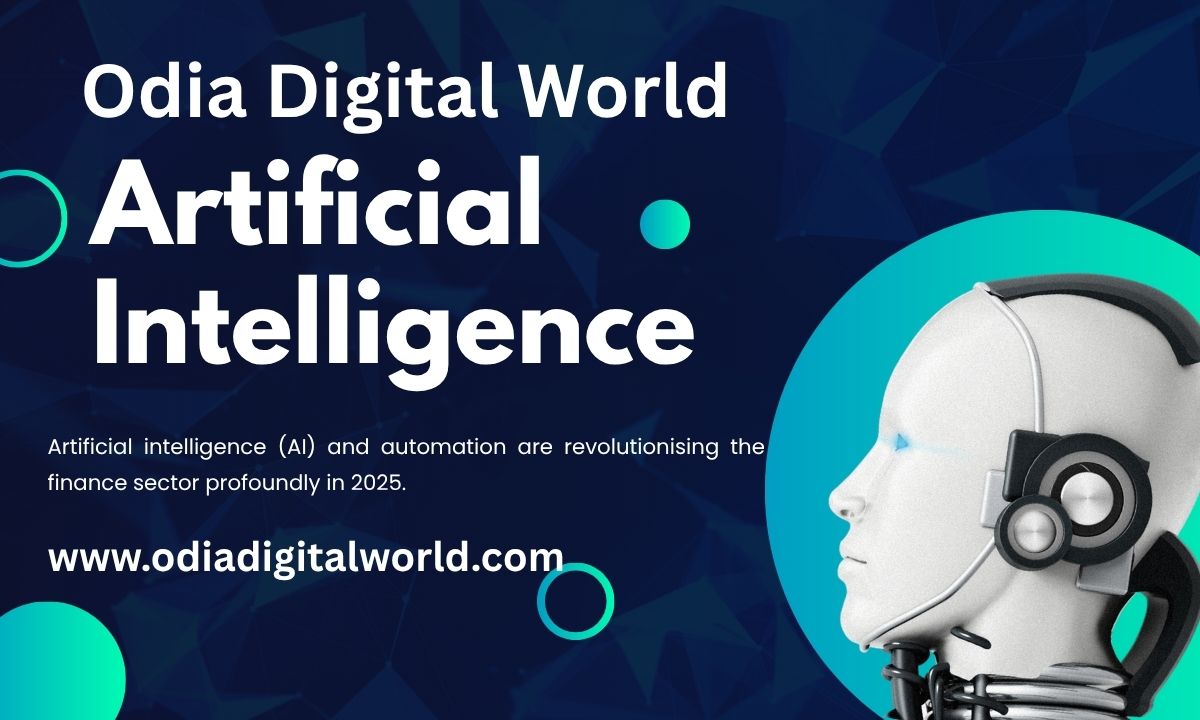Introduction:
Artificial intelligence (AI) and automation are revolutionising the finance sector profoundly in 2025.
These technologies are transforming how financial institutions operate, enhancing efficiency, accuracy, and customer experience while fundamentally reshaping roles and processes.
In 2025, AI is delivering remarkable benefits to finance leaders, transforming operational efficiency, risk management, customer experience, and business agility.
Below is an in-depth blog post that explores how AI is empowering financial leadership and redefining success in the digital finance era.
The Rise of AI and Automation in Finance
AI in finance now goes beyond simple automation of repetitive tasks.
Advanced machine learning algorithms, generative AI, and intelligent analytics enable financial firms to analyse vast data sets in real time, make faster decisions, and predict outcomes with unprecedented accuracy.
Automation solutions handle routine accounting, reconciliation, fraud detection, underwriting, and customer interaction, freeing finance professionals to focus on strategic, value-added activities.
Key Areas of Transformation due to AI:
1. Operational Efficiency and Cost Reduction
AI-powered automation streamlines back-office operations like bookkeeping, expense tracking, and compliance reporting by automating data entry and processing workflows.
This reduces errors, speeds up transaction handling, and slashes operational costs.
Financial institutions are seeing automation adoption rates soar as they seek to reimagine finance processes digitally for faster, more reliable operations.
2. Enhanced Decision-Making with Real-Time Analytics
Financial decisions that once took days now occur within seconds thanks to AI’s ability to process structured and unstructured data instantly.
From loan approvals to portfolio adjustments and risk assessment, AI fuels strategic decision-making with predictive forecasting, scenario planning, and anomaly detection.
This agility enables firms to respond tactically to volatile markets and seize fleeting opportunities quickly.
3. Advanced Fraud Detection and Risk Management
AI’s continuous learning models provide real-time updates to fraud detection algorithms, resulting in higher accuracy with fewer false positives.
This dynamic detection allows institutions to stay ahead of sophisticated fraud techniques while minimising customer friction.
AI also enhances risk evaluation by delving into large datasets for deeper insights and compliance monitoring.
4. Personalisation and Customer Experience
The use of generative AI and predictive analytics enables hyper-personalized financial advice tailored to individual behaviour and goals.
Virtual assistants and chatbots deliver context-aware, empathetic conversations, enhancing customer engagement and satisfaction.
AI also streamlines debt collection and customer support by tailoring interactions and escalating cases intelligently.
5. Transformation of Finance Roles
With automation handling up to 80% of routine finance tasks, workforce requirements are shifting dramatically.
Finance teams now emphasise analytical, advisory, and technology-driven roles rather than transactional work.
The future finance professional will combine human judgment with AI augmentation to focus on strategic insights and technology integration.
6. Looking Ahead: AI as a Core Finance Function
By 2025, AI will no longer be an ancillary technology but a central element in financial institutions’ strategic planning and operations.
Its integration extends from customer-facing services to regulatory compliance, investment strategies, and operational risk management.
Organisations adopting AI and automation holistically gain competitive advantages through agility, innovation, and cost-efficiency.
7. Transforming Data into Instant Decisions
Finance leaders are harnessing AI’s analytical power to convert vast streams of structured and unstructured data into real-time, actionable insights.
AI-powered dashboards fuel rapid, informed decision-making in key areas such as loan approvals, risk assessment, portfolio optimisation, and tax management.
Decisions that once required hours or days now happen within seconds, enabling leaders to capitalise on fleeting opportunities and navigate turbulent markets with confidence.
Predictive analytics and forecasting have become central tools, helping finance teams anticipate market fluctuations, optimise investments, and model scenario-based outcomes more accurately than ever before.
8. Delivering Hyper-Personalised Customer Experience
AI-led personalisation is fostering deeper customer trust and loyalty. By analysing transactional behaviours and preferences.
AI enables one-on-one financial recommendations, product suggestions, and empathetic conversations via virtual assistants.
These intelligent systems offer rapid, context-aware support — enriching the customer journey and increasing satisfaction.
AI also streamlines debt collection, tailoring outreach for better results while preserving positive client relationships, and broadens financial inclusion by evaluating creditworthiness from alternative data sources.
9. Quantifying AI’s Impact
The financial benefits of AI in finance are measurable and evolving. Organisations report significant improvements in productivity, decision speed, profitability, and customer retention. AI optimises investments, reduces fraud losses, accelerates market research, and increases overall enterprise efficiency.
Common advantages include:
Up to 80% automation of manual processes in routine finance operations
Faster loan and underwriting decisions, reducing approval times by 50–75%
Fraud detection accuracy rates exceeding 90%, with continuous real-time updates
Personalised offerings that increase conversion rates and customer lifetime value
10. Overcoming Challenges and Building Trust
With great potential comes great responsibility. Finance leaders are tasked with ensuring responsible AI adoption, from ethical data use to transparent governance and risk oversight.
Robust frameworks and continuous monitoring are essential to building trust with stakeholders and customers as AI grows in reach and complexity.
Finance professionals must also invest in upskilling their teams, fostering a culture of innovation, and maintaining a human touch alongside the digital transformation.
Here are three additional impactful ways AI and automation are revolutionising finance in 2025, explained in human terms with depth and relevance:
11. Agility Through Proactive Financial Leadership
In today’s unpredictable economic landscape, agility has become a key pillar for financial success.
AI equips finance leaders with advanced forecasting and scenario-planning tools that transform reactive decision-making into proactive strategy.
Instead of merely responding to market changes, finance teams now anticipate trends, risks, and opportunities ahead of time, allowing their organisations to pivot quickly and confidently.
This agility is powered by AI’s ability to analyse massive datasets in real time and generate actionable insights, enabling leaders to craft adaptable, resilient finance strategies that align with broader business goals.
Proactive financial leadership supported by AI fosters innovation and readiness, ensuring firms can navigate complexity without losing momentum.
12. Regulatory Compliance and Reporting Reimagined
The finance industry is one of the most heavily regulated sectors, and compliance management can be a costly and error-prone burden.
AI and automation now simplify regulatory compliance by continuously monitoring transactions, auditing data trails, and flagging anomalies that could indicate compliance risks or breaches.
Natural Language Processing (NLP) techniques allow AI systems to rapidly scan vast volumes of regulatory documentation, extract pertinent requirements, and generate audit-ready reports automatically.
This drastically reduces the workload on compliance teams, minimises human error, and enhances transparency.
Finance leaders gain peace of mind knowing their organisations remain closely aligned with evolving regulations in an efficient, scalable way.
13. Accelerated Innovation in Customer Interactions
AI-powered chatbots, virtual assistants, and personalised financial tools are transforming customer engagement by making services accessible 24/7 and tailored to individual preferences and financial situations.
These technologies provide instant support, simplify complex processes like loan applications or investment advice, and generate hyper-personalised product recommendations.
Automation of routine customer tasks frees human agents to handle more complex issues, improving overall service quality.
Moreover, AI helps banks and financial services reach underserved populations by using alternative data for credit assessments and automating onboarding, enhancing financial inclusion globally.
This accelerated innovation in the customer journey strengthens loyalty, drives growth, and positions finance firms as trusted digital partners.
Conclusion
AI and automation are revolutionising finance in 2025 by enabling faster, more accurate decision-making, reducing costs, strengthening risk and fraud controls, and delivering tailored customer experiences.
They empower finance professionals to move beyond routine tasks toward strategic advisory roles, ushering in a new era of intelligent, agile financial management.
This transformation is reshaping the very fabric of financial services, making it smarter, faster, and more customer-centric—fundamentally redefining what finance means in today’s digital world.
AI is delivering remarkable benefits to finance leaders in 2025, transforming operational efficiency, risk management, customer experience, and business agility.
AI is empowering financial leadership and redefining success in the digital finance era.







